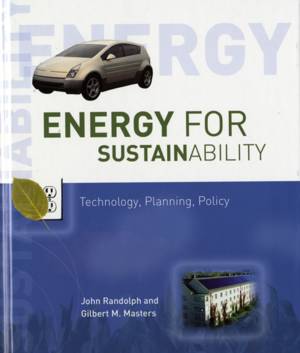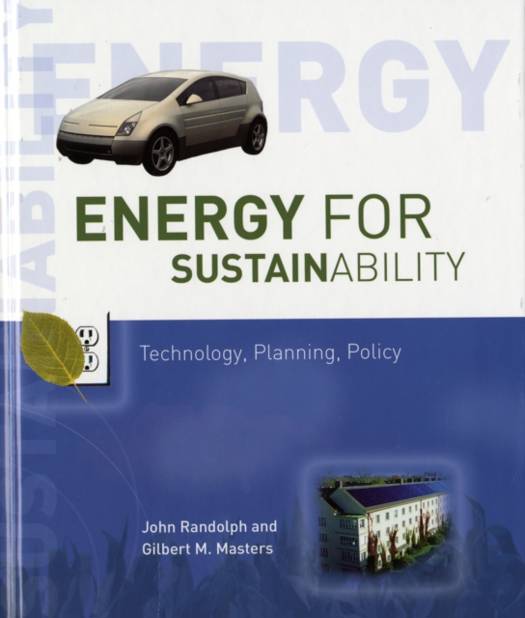
- Afhalen na 1 uur in een winkel met voorraad
- Gratis thuislevering in België vanaf € 30
- Ruim aanbod met 7 miljoen producten
- Afhalen na 1 uur in een winkel met voorraad
- Gratis thuislevering in België vanaf € 30
- Ruim aanbod met 7 miljoen producten
Zoeken
Energy for Sustainability
Technology, Planning, Policy
John Randolph, Gilbert M Masters
Hardcover | Engels
€ 113,45
+ 226 punten
Omschrijving
Energy for Sustainability is the first undergraduate textbook on renewable energy and energy efficiency with a unique focus on the community scale. Written by two of the foremost experts in the field, it is a pedagogically complete treatment of energy sources and uses. It examines the full range of issues--from generating technologies to land use planning--in making the transition to sustainable energy.
The book begins by providing a historical perspective on energy use by human civilizations and then covers energy fundamentals and trends; buildings and energy; sustainable electricity; sustainable transportation and land use; and energy policy and planning. Included in these topical areas are in-depth discussions of all of the most promising sources of renewable energy, including solar photovoltaic systems, wind turbines, and biofuels. In addition, the authors offer a thorough presentation of "green" building design, the impact of land use and transportation patterns on energy use, and the policies needed to transform energy markets at the local, state, and national levels. Throughout, the authors first provide the necessary theory and then demonstrate how it can be applied, utilizing cutting-edge practices and technologies, and the most current available data.
Since the dawn of the industrial age, the explosive growth in economic productivity has been fueled by oil, coal, and natural gas. World energy use nearly doubled between 1975 and 2005. China's energy use has been doubling every decade. The implications for the environment are staggering. One way or another, our reliance on fossil fuels will have to end. Energy for Sustainability evaluates the alternatives and helps students understand how, with good planning and policy decisions, renewable energy and efficiency can support world demands at costs we can afford--economically, environmentally, and socially.
The book begins by providing a historical perspective on energy use by human civilizations and then covers energy fundamentals and trends; buildings and energy; sustainable electricity; sustainable transportation and land use; and energy policy and planning. Included in these topical areas are in-depth discussions of all of the most promising sources of renewable energy, including solar photovoltaic systems, wind turbines, and biofuels. In addition, the authors offer a thorough presentation of "green" building design, the impact of land use and transportation patterns on energy use, and the policies needed to transform energy markets at the local, state, and national levels. Throughout, the authors first provide the necessary theory and then demonstrate how it can be applied, utilizing cutting-edge practices and technologies, and the most current available data.
Since the dawn of the industrial age, the explosive growth in economic productivity has been fueled by oil, coal, and natural gas. World energy use nearly doubled between 1975 and 2005. China's energy use has been doubling every decade. The implications for the environment are staggering. One way or another, our reliance on fossil fuels will have to end. Energy for Sustainability evaluates the alternatives and helps students understand how, with good planning and policy decisions, renewable energy and efficiency can support world demands at costs we can afford--economically, environmentally, and socially.
Specificaties
Betrokkenen
- Auteur(s):
- Uitgeverij:
Inhoud
- Aantal bladzijden:
- 790
- Taal:
- Engels
Eigenschappen
- Productcode (EAN):
- 9781597261036
- Verschijningsdatum:
- 30/06/2008
- Uitvoering:
- Hardcover
- Formaat:
- Genaaid
- Afmetingen:
- 216 mm x 255 mm
- Gewicht:
- 2213 g

Alleen bij Standaard Boekhandel
+ 226 punten op je klantenkaart van Standaard Boekhandel
Beoordelingen
We publiceren alleen reviews die voldoen aan de voorwaarden voor reviews. Bekijk onze voorwaarden voor reviews.











